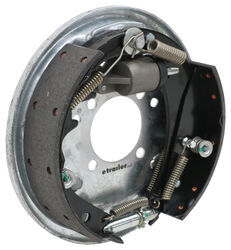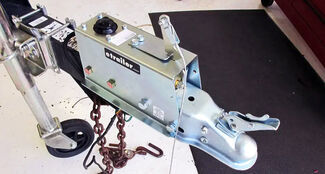
Determining If Surge Brake Actuator Has Lockout or If Brakes are Free-Backing
Question:
Hi. I recently purchased a 1997 eagle boat trailer in excellent condition. It has what looks like an original Demco trailer head with a brake fluid cap like the ones shown on your website. The cap shows on to turn one way and off to turn another way. The question I have is how do I know the surge brakes are on and working? When I back the boat up it does not lock up like other surge brakes I have seen. I also see in your website there are free backing brake drums. How would I know if that is what I have on the trailer?
asked by: Brandon
Expert Reply:
The only way to turn a surge brake actuator "off" is to engage a lockout on the actuator. Some actuators have manual lockouts, others have electric lockouts, and some have no way to lock out the actuator. Typically, free-backing brakes are used with actuators that have no lockout. As long as the trailer brakes engaging when your tow vehicle is stopping, the brakes are working correctly.
I have attached photos showing a manual lockout and electric lockout to help you determine if your actuator has either of these lockouts. The electric lockout is wired to the trailer connector to get signal from the vehicle's reverse light circuit.
The "on" and "off" indication on the cap are simply to let you know which way the cap screws on and off.
If you take the hubs off of your trailer's axle, you will be able to determine if you have regular hydraulic drum brakes or if you have free-backing brakes. Free-backing brakes have a fall-away shoe that is designed to only engage when the trailer is moving forward. When moving in reverse, the fall-away shoe provides only limited friction to the brake drum.
I have also attached a photo showing a free backing brake assembly with the fall-away shoe compared to a standard brake assembly.

Product Page this Question was Asked From
Demco Hydraulic Drum Brake Assembly - Free Backing - Galvanized - 10" - Right Hand - 3,500 lbs
- Accessories and Parts
- Trailer Brakes
- Hydraulic Drum Brakes
- RH
- 3500 lbs
- Brake Assembly
- Free Backing
- 10 x 2-1/4 Inch Drum
- Demco
more information >

Continue Researching
- Shop: Dexter Zinc-Plated Brake Actuator - Drum - Multi-Fit Ball - Bolt On - 7,000 lbs
- Shop: Trailer Hitch
- Shop: Demco Hydraulic Brake Actuator - Drum - Zinc - 2" Ball - 7,000 lbs
- Shop: Hydraulic Trailer Brake Kit - Uni-Servo - Free Backing - 10" - Left/Right Hand - 3,500 lbs
- Shop: Hydraulic Trailer Brake Kit - Uni-Servo - 10" - Left and Right Hand Assemblies - 3,500 lbs
- Shop: Suspension Enhancement
- Shop: Dexter Brake Actuator with Manual Lockout - Bolt On - Drum - 2" Ball - 7,500 lbs
- Shop: Dexter Zinc-Plated Brake Actuator - Disc - Multi-Fit Ball - Bolt On - 7,000 lbs
- Shop: Replacement Solenoid Valve for Dexter Brake Actuators with Reverse Lockouts
- Q&A: Converting Trailer from Surge Brakes to Electric Brakes
- Search Results: trailer brake lines
- Video: Review of Titan Brake Actuator - Bolt On Brake Actuator With Manual Lockout And Cap - T63FR
- Q&A: Length of 7,500 lb Dexter DX7.5L A-60 Drum Brake Actuator
- Q&A: Replacement for Atwood Surge Brake Actuator 82541
- Search Results: air lift 7500
- Video: Review of Dexter Axle Brake Actuator - Surge Brake Actuator - DX27FR
- Search Results: surge brake actuator
- Video: Titan Brake Actuators with Reverse Lockout Replacement Solenoid Valve Installation
- Q&A: Could Dexter DX7.5L A-60 Coupler Fit on 3x3 Trailer Tongue
- Video: Titan Brake Actuator T4748800 Review
- Search Results: air lift accessories and parts
- Q&A: What is the Difference Between a Manual Lockout and No Lockout Brake Actuator
- Q&A: Ideal Leaf Spring Hanger Spacing for Tandem Axle Trailer Using # e34SR 6000 lb Leaf Springs
- Video: Demco Hydraulic Brake Actuator Review
- Video: Titan Brake Actuator T2346300 Review
- Video: Curt Trailer Hitch Installation - 2021 Jeep Wrangler
- Q&A: What Oil Should be Used in Dexter Oil Bath Hubs
- Article: Most Popular Wheel Bearings
- Shop: Trailer Wiring
- Search Results: brake actuator































